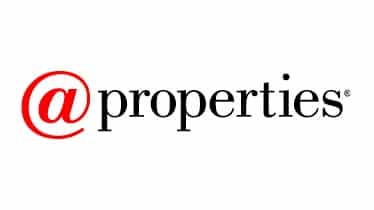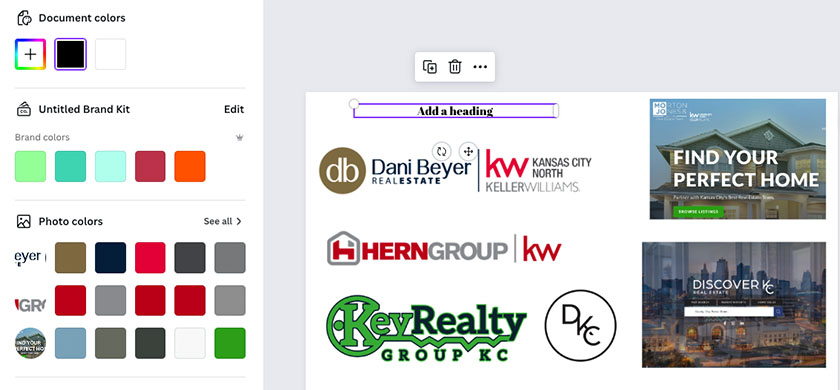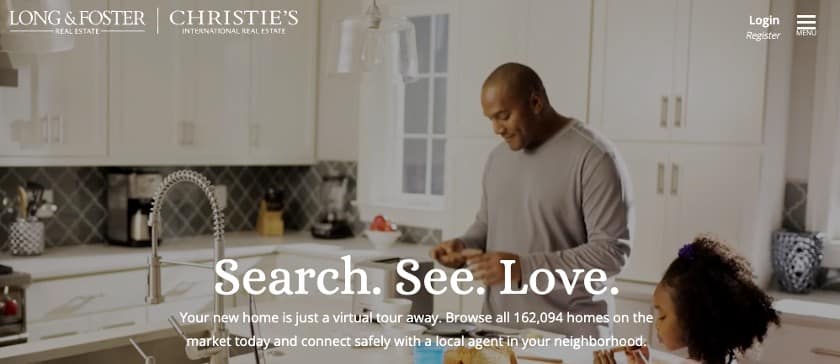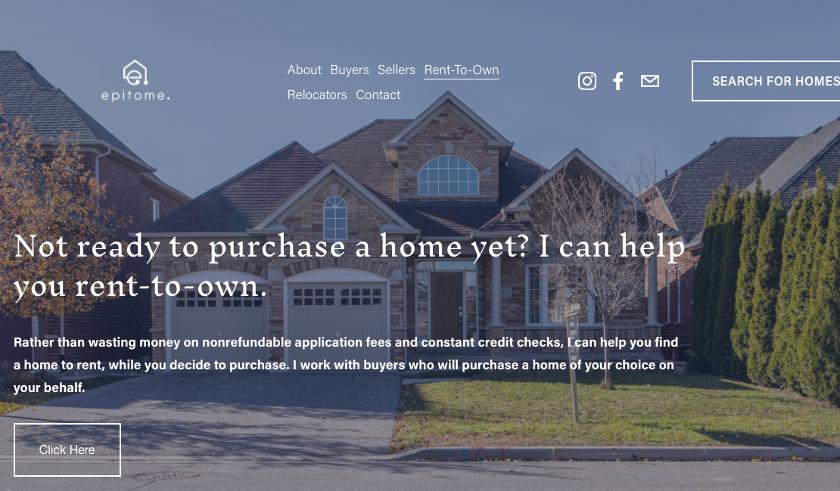Creating a Memorable Real Estate Brand
Building a strong real estate brand is crucial for establishing yourself as an authoritative figure in your community as a real estate professional. It not only helps in generating more leads and clients but also eliminates the need to constantly prove your expertise to each individual. However, creating a powerful realtor branding requires careful evaluation of the competition, designing a logo, website, and marketing materials, as well as establishing a solid online presence.
To assist you in gaining confidence in this process and growing your business, here are 11 vital steps, tips, and real-world examples of successful real estate branding.
1. Determine Your Unique Selling Proposition
Effective real estate brands are clear and memorable. However, you can’t create a memorable brand if you don’t know what your competition is saying and offering. Therefore, one of the most important tips for branding real estate is to evaluate your competition.
Start by finding successful real estate agents, teams, and brokerages in your farm area. Pay special attention to their business name, logo, and slogan. What does their branding look like? Is it more traditional, modern, or elegant? What do you think they’re doing wrong? This will help you identify different offerings and gaps in the market, and ultimately create a unique selling proposition (USP) to inform your branding.
If you’re a new agent or just new to branding, it may be confusing to look at other examples of real estate agent branding and determine how to differentiate yourself. Here are some questions to help get your wheels turning about your unique offerings compared to other agents in the area:
- Are you tech-savvy?
- Do you have excellent marketing skills?
- Do you have great closing skills?
- Do you have a great network of agents, lenders, or contractors?
- How many deals have you closed?
- Do you specialize in a small neighborhood?
- How well do you know the neighborhood?
- Are you a master of Facebook advertising?
- Do you have a great eye for design?
- Do you have a professional background or skills that can help your clients?
- How long have you worked in the industry?
- What’s your work ethic like?
- Are you a data-oriented person?
- Great at crunching numbers?
- Do you have strong organizational skills?
Once you’ve gathered your answers, you can compare them to your competitor research. This will help you clearly identify areas of your business where you stand out from others, like your previous careers, personal strengths, or niche expertise.
Sample brand colors and photo colors (Source: Canva)
To make the process easier, take screenshots of their websites, logos, and slogans and compile them into a document in Canva. Seeing them all together in one place will help you find out what they have in common, or give you an opportunity to create a new and unique brand based on your research. Canva even has a tool to help you gather colors from photos and save them to your brand kit. Start using Canva for free today.
2. Establish a Timeline
If you’re starting from scratch, the first step to creating a strong and trustworthy real estate brand is not to tackle it all at once. The best real estate branding can take years to develop and can encompass so many different elements of your marketing.
By setting specific goals and due dates to build your brand over time, you’ll avoid spending too much time or money on unnecessary marketing tools before you even serve clients. Instead, you can—and should—create the branding elements you need to generate real estate leads (like a logo, social media templates, and headshot) while you serve clients, growing your business, income, and brand simultaneously.
Here’s an example of a timeline with the key aspects to include and sample dates:
- Research competition and identify USP (April 20)
- Decide on mission, values, and vision statements (April 24)
- Get professional headshots (April 30)
- Find graphic designer/design tool to create a logo, and decide on brand colors and fonts (April 30)
- Create profiles on listing platforms (May 5)
- Complete real estate website or landing page (May 15)
During this planning time, consider the foundation of your brand, such as your ideal clients (like first-time homebuyers vs investors, or young professionals vs empty-nesters), the geographical area you plan to work with, your values, and your mission. Once you have these foundational elements, you can start building basic branding elements that will speak to the right people and set you apart from the competition.
3. Utilize Professional Tools & Experts
Many agents and brokers spend hours or days trying to learn graphics programs and manually create their own real estate marketing materials. However, outsourcing this work to design companies and professionals is often a more efficient and cost-effective strategy to get a professional design. Whether you choose to hire a professional or do the work yourself, make sure you use the right sources and tools.
Click through the tabs below and discover ways to get high-quality graphics for your website and other marketing collaterals:
|
Provider
|
|
|
|
|---|---|---|---|
|
Best For
|
Agents or teams who want to customize their own branding and templates with an easy-to-use graphic design platform
|
Real estate professionals who want to see branding concepts before choosing a design
|
Agents, teams, and brokers wanting to hire a branding freelancer for custom requests
|
|
Key Features
|
|
|
|
|
Starting Price
|
$0
|
$199 per contest
|
$5
|
|
Visit
|
4. Decide on Your Mission, Values & Vision Statements
Every brand has core values that define how they serve and market to clients. Even if you don’t already have a strong mission or a cause you’re passionate about, it’s not difficult to define the values that are most important to you. In order to blend these values into your real estate business plan, they should be personal to you and also beneficial to your clients.
For example, honesty may be one of your strongest values. This value benefits your clients by helping them see property problems with more accuracy—even if they are emotionally attached to it. In this way, your value of honesty can truly help homebuyers make the best choice for their needs.
5. Create a Memorable Logo
Although your logo may seem like a small piece of your branding, it’s an integral element of your real estate branding. It will be displayed on your ads, business cards, website, social media, and direct mail, so it’s important to create a professional logo that you can use to build brand recognition over time. Logos should be based on your values, target audience, and personality.
6. Pen an Unforgettable Slogan
While realtor taglines and slogans may not be necessary for every agent or broker, they can be a powerful asset for growing a memorable brand. A strong real estate agent slogan can create an emotional connection with potential buyers and sellers by clearly describing your unique qualities and offerings.
To start thinking about catchy slogans, refer to your unique selling proposition (USP) and competition research. Sit down with a pen and paper, think about unique or identifying features of yourself, your clients, or your farm area, and write down every idea that comes to your head. Play around with different words and phrases until you find something that fits your brand.
7. Take Your Real Estate Headshot
Having a real estate headshot is a key part of your real estate branding. Many agents choose to include it on different marketing pieces like their website, flyers, and even their real estate signs. Since it can be a saturated industry, adding a face to the branding for real estate agents can build familiarity and trust. However, even if you don’t include your headshot on many marketing materials, it’s important to have a strong headshot on your website and social media pages.
8. Design a Website & Landing Page
For most real estate agents and brokers, the website is considered the centerpiece of their marketing strategy. Even if you market heavily through ads or social media, having a website for potential clients to learn more about you and search for properties is essential. In addition, many real estate marketing strategies utilize landing pages to speak to a specific subset of their audience or to collect leads from advertisements.
If you’re unsure how to set up your website, refer to other agents’ websites for inspiration. Make sure to also think about your marketing strategy as a whole, identifying how potential clients will discover your website or landing pages. Then, get feedback from members of your target audience, like friends, family members, or previous clients.
9. Produce Real Estate Branded Collateral & Promotional Materials
Developing a real estate brand is an art, not a science. What one successful agent uses may not apply or be effective for your target audience, style, and marketing strategy. As your brand grows, you should continue to create and develop branded collateral specific to your marketing needs. This can include flyers, letterheads, social media graphics, or even unique pieces like stickers or GIFs.
To determine what types of materials to make, reference your marketing strategy and business plan. If your target audience is most active on social media, consider creating online resources like printable guides, blogs, introduction videos, or customized emails. On the other hand, if you want to target homeowners in a specific location, print materials or local events will be a more effective strategy to reach them. Ultimately, creating brand materials that fit your business is key for building brand recognition and converting leads into clients.
10. Create Profiles on Major Listing Websites
Even if you create the perfect real estate brand for yourself, it won’t successfully grow your business if you don’t put it where people will see it. One of the most simple ways to find leads and drive traffic to your brand is by creating a team or agent profile on the top real estate listing websites. Most real estate platforms offer the ability to add extensive details to set yourself apart from the competition.
11. Build Your Online Presence
Social media is crucial for spreading awareness and getting your brand in front of potential clients. It is also important for building trust, since 46% of consumers say that they trust online business reviews as much as personal recommendations from friends or family. Here are some of the most widely used social platforms to think about:
- YouTube
- TikTok
You do not have to use every social media platform available, but you should choose two to three that are familiar, and that you can commit to using on a consistent basis. Before choosing your platforms, consider your target audience’s demographics. If your audience is first-time homebuyers who are, on average, 36 years old, Facebook would be your best outlet because 77% of their audience is between 30 to 49 years of age. Building an online presence to reach your intended clientele will yield better leads and more growth.
Why Is Real Estate Branding Important?
Consumers in 2023 see an average of 4,000 to 10,000 advertisements every day. Without making strategic choices about your real estate branding and marketing strategy, it’s unlikely that potential clients will notice or remember you.
Building a realtor brand can seem like a confusing and overwhelming task, but it essentially comes down to differentiating yourself from the other real estate agents marketing to your audience. It also is about making yourself appear trustworthy, which 31% of individuals find to be the most important attribute of someone’s personal brand.
Here are a few notable real estate branding statistics that prove its importance:
- People make subconscious judgments about a product or brand within 90 seconds.
- 65% of consumers have felt an emotional connection with a brand.
- Customers who develop a bond with businesses are over 50% more valuable than other customers.
- Businesses and brands that inspire stronger emotions in customers receive three times more referrals and word-of-mouth business.
- 88% of consumers say they will choose brands that portray authenticity, and 66% of consumers say transparency is one of the most important qualities in a brand.
- Using a signature brand color can increase brand recognition by 80%.
- It typically takes five to seven brand interactions before a consumer remembers the brand.
Common Realtor Branding Mistakes
Creating a real estate brand is an organic process that naturally grows and develops over time. Even when you follow the steps in this guide to build a strong foundation for your brand, it is inevitable that you will encounter challenges and adaptations as your brand grows.
To help you establish and grow a brand that will benefit your career in the long term, make sure you avoid making some important branding mistakes. A few of the most common real estate branding mistakes include:
- Boxing yourself in: The real estate brand you start creating the day you receive your real estate license will not be exactly the same after you’ve been an agent for 20 years. Your brand will grow and change along with the real estate market, so don’t start with a brand built on something hyper-specific, like a niche or location.
- Overgeneralizing: The flip side of being too specific about your brand is being too general, which is much more common for new real estate agents. If you try to appeal to every potential buyer and seller on the market, you won’t appeal to anyone.
- Inconsistency: Make sure to choose one business name and simple branding elements (like colors, fonts, and graphics) that you can use on every marketing channel. A fast way to lose potential clients is by confusing them with different names, photos, logos, and taglines.
- Being too “salesy”: Remember that every follower or potential lead is thinking, “What’s in it for me?” Build a brand based on the benefit you provide to clients, not your qualities or accomplishments.
- Not promoting your brand: Once you have a logo and branding materials, make sure to use them. Use your colors and graphics to make social media graphics, email templates, and print materials. The more your customers and followers see your branding, the more easily you’ll build brand recognition.
- Not utilizing resources and tools: Building a cohesive brand across your website, social media pages, listing platforms, and print materials can be challenging. If you don’t have experience with graphic design or marketing, manually creating each piece will be extremely time-consuming. Investing in a tool or professional expertise is a simple way to ensure your branding is professional and ready to use.
Bottom Line
Creating a strong realtor brand may demand considerable effort, but it is an essential component in establishing a sustainable real estate career. A successful brand should reflect your values and offerings, and connect with your target audience through both online and offline marketing efforts. By developing a suitable real estate brand that aligns with your clients’ needs, you can effectively expand your customer base, showcase your unique personality, and thrive in your business endeavors.





